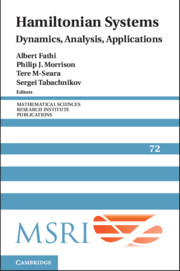Book contents
- Frontmatter
- Contents
- Denjoy subsystems and horseshoes
- Impact Hamiltonian systems and polygonal billiards
- Some remarks on the classical KAM theorem, following Pöschel
- Some recent developments in Arnold diffusion
- Viscosity solutions of the Hamilton–Jacobi equation on a noncompact manifold
- Holonomy and vortex structures in quantum hydrodynamics
- Surfaces of locally minimal flux
- A symplectic approach to Arnold diffusion problems
- Hamiltonian ODE, homogenization, and symplectic topology
Some remarks on the classical KAM theorem, following Pöschel
Published online by Cambridge University Press: 10 May 2024
- Frontmatter
- Contents
- Denjoy subsystems and horseshoes
- Impact Hamiltonian systems and polygonal billiards
- Some remarks on the classical KAM theorem, following Pöschel
- Some recent developments in Arnold diffusion
- Viscosity solutions of the Hamilton–Jacobi equation on a noncompact manifold
- Holonomy and vortex structures in quantum hydrodynamics
- Surfaces of locally minimal flux
- A symplectic approach to Arnold diffusion problems
- Hamiltonian ODE, homogenization, and symplectic topology
Summary
We propose a slight correction and a slight improvement on the main result contained in “A lecture on Classical KAM Theorem” by J. Pöschel.
The paper [5] contains a very nice exposition of the classical KAM theorem which has been very influential. It is our purpose in this short and non-self-contained note to add two remarks to this remarkable paper.
The first one concerns a technical mistake in the proof of the main abstract statement Theorem A, 1 which has been recently pointed out and corrected in the PhD thesis [3]. Yet a correction of this mistake, following Pöschel arguments, leads to a final statement which is both less elegant and quantitatively weaker. We would like to explain how, by modifying slightly the arguments using ideas due to Rüssmann (see for instance [7]), Theorem A of [5] can be proved without any changes. The aforementioned modifications consist of replacing the crude Fourier truncation by a more refined polynomial approximation, and then set an iterative scheme with a linear,2 rather than super-linear, speed of convergence
Information
- Type
- Chapter
- Information
- Hamiltonian SystemsDynamics, Analysis, Applications, pp. 67 - 74Publisher: Cambridge University PressPrint publication year: 2024
